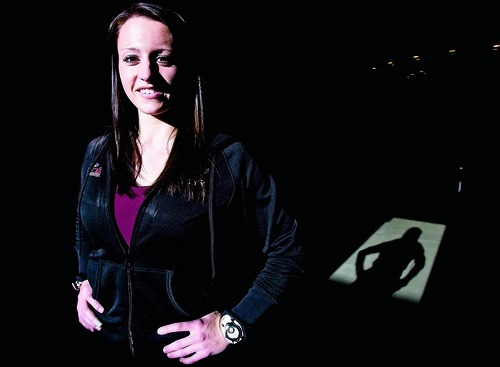This is an archived article that was published on sltrib.com in 2011, and information in the article may be outdated. It is provided only for personal research purposes and may not be reprinted.
When she was first diagnosed with breast cancer and underwent a mastectomy, former Utah gymnast Annabeth Eberle confessed she went into "hermit" mode. She'd spent much of her life in a sport that stressed aesthetics and couldn't imagine going out of the house following the surgery.
"They took tissue from my stomach, so I have an enormous scar from one hip to the other and it was hard to cover up," she said. "Gymnasts are so particular about your body, and when something happens we always freak out. I always said scars were cool in gymnastics, but this was different."
Now several months removed from the shock of being a 27-year-old with cancer, Eberle is past both the hermit and freak out stages and has moved into the public arena as a spokeswoman for Breast Cancer Awareness when the Utes host Arizona State on Friday.
Long an example of athletic vitality and prowess, she's now an example that even young, healthy women aren't exempt from cancer.
"I'm not trying to be conceited, but maybe seeing me, people will realize this can happen to anyone, even athletes and you need to go and get checked and be aware of your body," Eberle said. "That is what saved my life."
Eberle didn't suspect she had breast cancer but at the prompting of friends, mentioned to her doctor during an exam she noticed one of her breasts getting smaller. A few follow-up tests later, Eberle was being scheduled for surgery and struggling to come to terms with the diagnosis and forcing her to compete with a foe she was uncertain how to beat.
"In gymnastics when you get injured I was always 'Ok, let's get this fixed and move on in the sport,' " said Eberle, an eight-time All-American and two-time NCAA regional floor champion during her career (2002-05). "This was something different for me. I didn't even have time to understand what was happening to me or how to focus on recovery. It wasn't a sports injury but a real-life injury."
Luckily for Eberle, her recovery was quick because she didn't have to undergo any chemotherapy or radiation treatment after tests showed she was in "zero stage," she said.
Feeling fortunate the cancer was diagnosed early, Eberle is now intent to get the message out to other women to not ignore their intuition or their doctor appointments.
"The biggest thing is to speak up and don't be afraid to talk to your doctor," she said. "I was in that position, thinking, 'I'm 27, there is no way I could have cancer,' but I was wrong."
Breast cancer awareness nights have always been popular in gymnastics given the female-dominated audience. For Eberle, they always meant a little more to her because her grandmother was diagnosed with breast cancer too. But now that she has had her own experience the meets are even more significant to her.
"At first I had a hard time accepting it but now I want to do more," she said. "Now I notice every breast cancer thing, everywhere."
Her experience has heightened awareness in the gymnastics program too, Utah coach Greg Marsden said.
"It really hits home because she was one of our athletes not long ago," he said. "She has been great in terms of wanting to share her story that by chance of mentioning it to a doctor it was discovered. Even young women can't ignore things and should get checked out."
Eberle, who has been admitted to physician's assistant school, said she will have a new respect for future patients because of her experience.
"This was the hardest thing I've ever gone through," she said. "I thought being done with gymnastics was hard and going through that, but it doesn't compare to this."
Breast cancer awareness
American Cancer Society guidelines for early breast cancer detection:
• Yearly mammograms recommended starting at age 40.
• Clinical breast exam about every three years for women in their 20s and 30s and every year for women 40 and over.
• Self breast exams for women starting in their 20s.
• Some women — because of their family history, a genetic tendency or certain other factors — might need to be screened with an MRI in addition to mammograms. —
Arizona State at No. 3 Utah
P At the Huntsman Center
Time • Friday, 7 p.m.
Records • Utah 3-1; Arizona State 1-6
Series • Utah leads, 61-15-1
Last meeting • Utah, 196.475-195.7, 2010
About the meet • The Utes are coming off a 196.825-196.5 loss to Stanford that ended Utah's home winning streak at 20 meets. … Utah has won the last eight meets between the two teams since a 2003 loss in Salt Lake City. … The Utes have hit 90 of 96 routines. … Stephanie McAllister and Mary Beth Lofgren are tied with three individual titles each. … Jacquelyn Johnson is questionable for the meet as she recovers from a concussion.



